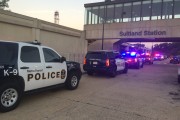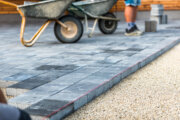Building codes are a set of established standards that are put in place to ensure public health, safety and welfare. These codes protect the property and its occupants from a wide range of potential hazards.
Building codes can vary from city to city and are enforced at the municipal and sometimes state level. While building code violations can be serious, most homeowners may be unaware of any infringements on their property.
— Common housing code violations.
— Who checks for housing code violations?
— Is your house to code?
— Can you still sell your house?
— How do you know if your house is to code?
— Can code violations be fixed?
— How can code violations be fixed?
[Read: How to Buy a House.]
Common Housing Code Violations
Here are some of the most common housing code violations:
— Common life safety. Missing, outdated or improper life safety devices are a common safety issue found by inspectors. “We see out-of-date smoke detectors and missing carbon monoxide alarms,” explains Rosanna Buckley, a Maryland and Washington D.C. home inspector with US Inspect. “Fire egress is really important. Whenever I see a basement bedroom, you have to have two means of egress. There are regulations as far as how high the window can be,” she added.
— Electrical. Electrical problems include grounding and bonding issues, missing or improper labeling of circuits and missing GFCI receptacles. “Many older houses do not have GFCI receptacles,” Buckley says. “It’s a requirement for current standards to install a GFCI receptacle whenever you’re within 6 feet of a water source.” These receptacles can help prevent electrocution by cutting off the power when they’re tripped.
— Mechanical. According to the Common Code Noncompliance Survey Report published by the International Code Council and National Association of Home Builders, improper notching or boring of framing, inadequate combustion air or makeup air and the improper venting of appliances are the most common mechanical violations. These issues can weaken the structure of the home, cause your heating systems to become inefficient and produce fatal carbon monoxide gas.
— Plumbing. Non-professional plumbing is one of the biggest causes of plumbing code violations. Missing nail plates and improper support of piping can cause pipes to leak or even break.
— Handrails and decking. “Missing handrails alongside steps and issues with decks are also common finds,” says John Wessling, president of the American Society of Home Inspectors and owner of Wessling Home Inspection Services. Handrails frequently violate housing codes if they are at an improper height, not properly fastened, have an inadequate gripping surface or are missing entirely.
— Window or door. Improper flashing was the most commonly cited violation with windows and doors. Flashing is a layer of waterproofing to protect the door, window and framing from water damage and prevents moisture from entering the home. “If moisture gets into the house or gets into places and sits for a long time, it can create conditions conducive to mold growth,” says Buckley. “That can cause health problems for your family.”
[READ: Kitchen Remodel Costs to Consider.]
Who Checks for Housing Code Violations?
General inspectors like Wessling and Buckley don’t check for code compliance or violations. “Independent home inspectors provide a visual inspection and a written professional opinion based on best practices for modern construction standards,” explains Wessling.
Building code inspections are performed by the city or county code inspectors. “They have the authority to make someone correct/repair any code violations,” Wessling adds. “They are looking for health, safety and other matters based on the local code adopted by the alderman or municipal council.”
According to Dominic Sims, CEO of the International Code Council, most residential codes are enforced at the local level. “Most violations are reported by owners or occupants of the dwelling to a local building or fire department.”
Is Your House to Code?
Wessling sees safety issues in homes almost daily. “It may be more common with older homes, but I have seen significant problems with new construction,” he says. “One new home I inspected resulted in the home being condemned before anyone could even move into the structure.”
The Common Code Noncompliance Survey Report also found an upward trend of code violations in new homes. Over 60% of survey respondents found all types of new construction to have code violations.
It’s even less surprising to find code violations in older homes. “Common issues that we see in general during home inspections are usually in older homes due to delayed maintenance and out-of-date standards,” Buckley says.
Can You Still Sell Your House?
If your house is cited as being in violation of certain housing codes, then it may need to be fixed first.
“Code violations can prevent the occupancy of a home,” says Wessling. “Some areas require their municipal official to inspect the home before listing. Generally, if something is cited as a code violation, someone (either the buyer or seller) will need to fix it to satisfy the local building official.”
Sims recommends getting a home inspection before closing on a house. “Code violations can be discovered by the home inspector. If they’re serious they should be corrected before the transaction is completed,” he adds.
[See: How Much Will Your Remodel Cost?]
How Do You Know if Your House Is to Code?
“Code can be a complex issue. The only people who can call a property up to code are the local code authority/official and local utility companies,” explains Wessling. He also noted that most items are considered to meet code as long as the system met code when installed, remains in a safe, functional condition and has not been altered.
However, there are several ways to look up whether or not a house is up to code. “Buyers can review the permits issued and approved by the local jurisdiction for the property,” says Sims.
Sims also recommends checking out the Code Council’s U.S. code adoption database or learning more about the International Residential Code. The IRC is the model code used in 49 U.S. states and other countries. It’s updated every three years through a consensus-based process.
Can Code Violations Be Fixed?
Code violations can certainly be fixed and they may be required if it’s been reported to the local officials. Sims explained that the local jurisdiction or code official will verify if the violation exists and then notify the owner.
The owner of the house will then be given an opportunity to correct the violation in a reasonable amount of time. However, the violation will need to be addressed right away if there’s immediate danger.
How Can Code Violations Be Fixed?
While some code violations can be easily fixed, like minor updates or repairs, others may require the expertise of a professional, such as electrical, plumbing or HVAC systems. Not only will it be safer, but a professional can also make sure these systems are functioning properly. Some building permits may also require a professional to complete the project.
More from U.S. News
The Best Free Interior Design Apps
Home Renovation Comparison: How Much Will Your Remodel Cost?
7 Tips for Updating Your House in an Up-and-Coming Neighborhood
Common Housing Code Violations and Questions to Ask About Them originally appeared on usnews.com
Update 01/31/22: This story was published at an earlier date and has been updated with new information.






